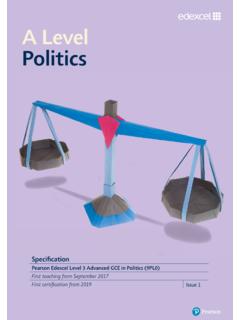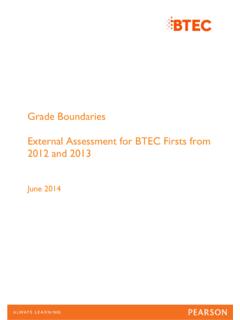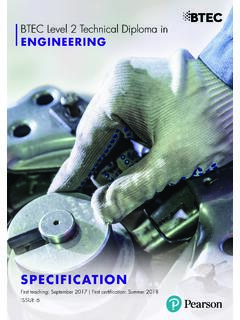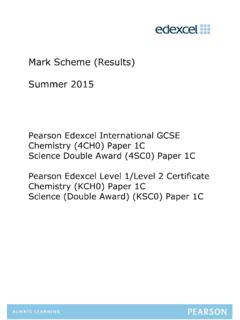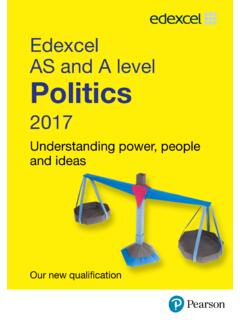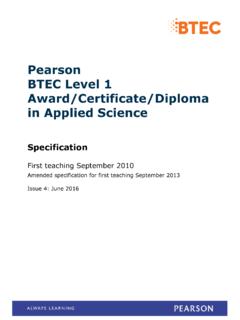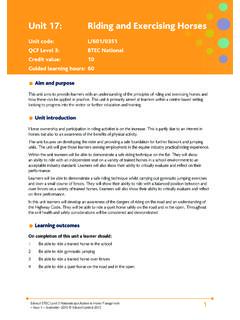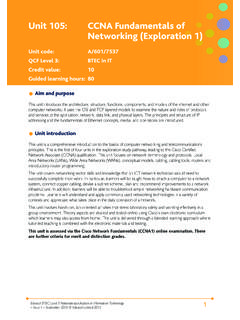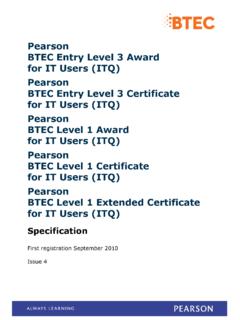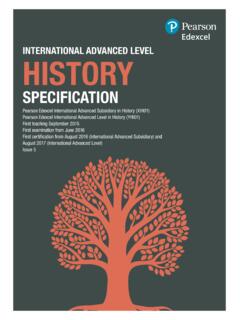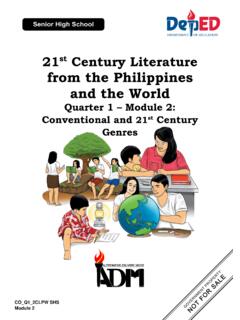Transcription of A level English Literature coursework coursework advisory ...
1 Pearson Edexcel level 3 Advanced GCE in English Literature NEA key coursework guidance Issue 3 December 2020 Author and Approver: GQ Product Management DCL1 Pearson Education Limited 2020 A level English Literature coursework Summary of key guidance (updated 1 December 2020) We offer an optional coursework advisory service (CAS) if you wish to receive guidance on choosing texts and titles for the coursework component. You are not allocated an individual coursework advisor. You submit your texts and titles to CAS if you would like guidance. There is no requirement to have your texts approved. When unsure about a text, you may use your professional judgement basing your decision on whether you think the texts are of sufficient 'quality' to give your students access to the best opportunity to achieve across the full range of marks, and also whether students will be able to find suitable critical material to address A05 and contextual material for A03.
2 texts and titles should only be submitted to the CAS after you have reviewed the suitability of the texts yourself, for example by: Sampling texts you re not familiar with. Reviewing the range and quality of secondary material available for the texts to ensure that the texts offer good coverage of all the AOs. Checking titles against the advice in the guidance documents. The CAS link takes you to guidance on choosing texts and formulating titles and includes a link to our Getting Started Guide which has a large number of examples of texts and titles to guide you in your choice. You may also like to consult the list of texts below that have received feedback on their suitability. If you need additional guidance following feedback on your initial submission to the CAS, you should submit another online form. You can also access this student video and presentation, which explains the whole process of coursework from start to finish.
3 coursework text choice P. 20 of the specification states: centres must select complete texts which may be drawn from poetry, drama, prose or literary non-fiction . The 2 texts selected must be complete texts , published in their own right as books . So for short stories a collection such as The Best Short Stories of Edgar Allen Poe rather than a single short story such as The Tell-tale Heart must be selected. Allowed Any text from the specification that has not been studied for another component in the specification. texts of similar quality to those in the specification. texts by the same authors as those who have set texts in the specification. 2 texts by the same writer. See also the examples given in the Getting Started Guide and below. Not allowed texts in translation ( A Doll s House). Screenplays. Pearson Edexcel level 3 Advanced GCE in English Literature NEA key coursework guidance Issue 3 December 2020 Author and Approver: GQ Product Management DCL1 Pearson Education Limited 2020 Avoid Established GCSE texts * ( To Kill a Mockingbird, The Strange Case of Dr Jekyll and Mr Hyde, Macbeth, or Romeo and Juliet), regardless of whether your students have studied them at GCSE.
4 Children s Literature ** ( Alice in Wonderland). Youth Literature ( The hunger games ). Populist texts for which there is unlikely to be suitable critical material ( The Da Vinci Code). * texts commonly studied for GCSE (or KS3) should be avoided because of the potential of narrowing the curriculum, which could occur when a student studies a text more than once in their school career . Other possible concerns are the availability of secondary materials pitched at KS3 or KS4. It may be difficult for a student to judge whether secondary material is appropriate for A level study. In addition, texts which have been on GCSE specifications have been judged to be suitable for readers in the 14-16 age range. At A level , students have the opportunity to select texts which require a greater degree of maturity. The intention of A level coursework is also to allow students to pursue autonomous study and select texts which interest them individually.
5 A level coursework can allow the study of texts from a more diverse range of writers than is supported by the requirements of the National Curriculum at KS4 and the subject criteria for GCSE English Language and Literature . **Children's Literature is, of course, studied at university. Undergraduates read a large number of texts in an intense manner, allowing them to consider individual works of children s Literature in a wider context of both other texts in the genre and other types of Literature . At A level , students study a much narrower range of texts and it is potentially very challenging to write well on children s Literature and address all of the AOs. Other considerations: Poetry/short stories: students must select a published collection and their coursework must consider a reasonable number of poems/short stories. There are no numerical rules on how many must be referred to in the coursework . This will depend on the length of the individual items and the focus of the coursework title.
6 Students may not select the same collection of poems chosen for 9ET03 and write on the rest . If they wish to write on poetry for coursework , they need a different published collection of poems to that selected for 9ET03. Text pairing: We do not recommend comparing a collection of poetry with another collection of poetry, or short stories with short stories, for example, because of the complexity of moving between a very much multiplied number of texts when making comparative points in relation to the coursework focus. If an anthology of poetry or short stories is selected, we would advise a single whole text (such as a novel or a play) for the second text. Consider the two texts together with the title when making a judgement: a substantial, established novel exceeding 500 pages (such as Middlemarch) could be balanced by a lighter choice such as The Yellow Wallpaper. When a very recent text is selected, such as Hamnet by Maggie O Farrell, it can be helpful to select a more established text to pair it with as it can be more difficult to find secondary material on newer texts .
7 This is a two-text component. Students should not select more than two primary texts to compare. They should treat the texts roughly equally in terms of the word count given to each text. What makes a good coursework title? You are advised to adopt a title which encourages students to address all five assessment objectives. For example: 'With reference to your wider critical reading around text A and text B, compare how writer X and writer Y present Z.' Or: Pearson Edexcel level 3 Advanced GCE in English Literature NEA key coursework guidance Issue 3 December 2020 Author and Approver: GQ Product Management DCL1 Pearson Education Limited 2020 'Compare Z in text A and text B considering the contexts of their production and reception and the different ways in which these texts have been read . You may like to review the suggested coursework titles in the Getting Started Guide, for many examples of appropriate texts and tasks.
8 This coursework title checker allows you to work with students or colleagues to see whether proposed titles will allow students to address all the AOs. Some teachers and students also use a model with a quotation (often a critical view on a text), followed by a title which responds to the quotation. Where this model is chosen, it s important to ensure that the link between the quotation and rest of the title is clear, and that the whole title works grammatically. coursework titles must include: The full titles of both texts and the names of their authors. A focus for the comparison-we advise using a single focus such as the presentation of power rather than 2 or more concepts such as religion and power . The title should ideally flag AO2, for example through the use of the word present to ensure the candidate devotes sufficient attention to the analysis of the writers crafts. It is advisable to include: Compare to flag AO4.
9 A phrase referencing wider reading around the texts and/or the contexts of the texts production and reception and the different ways in which these texts have been read in order to flag AOs 3 and 5. Can my students all write on the same texts and the same title? Teachers must consider the range of ability and interest in their cohort, ensuring that students interests and abilities are catered for, and that students have the opportunity to work independently on their coursework . Students can be involved in formulating coursework titles and should have some element of choice of texts /titles. So, it's fine for more than one class/student to study the same text/s, but a choice of tasks should be available. Many teachers offer a short list of text combinations such as: Heart of Darkness and Things Fall Apart Brick Lane and The Joy Luck Club Oryx and Crake and Year of the Flood (Margaret Atwood) Students will then generate possible titles, or choose from a shortlist of titles on each text combination.
10 Another successful approach is to teach one text to a class and offer a shortlist that students choose from for the second text and a choice of titles. What help can I give students? How many drafts should I mark? May I give students provisional grades for their coursework drafts? There is guidance on these areas in the specification starting on page 23. Full rules are in JCQ in the documents listed for both students and teachers under Non Examination Assessments. Teachers generally mark one draft only of students work. They are permitted to provide general feedback. Teachers should not provide students with provisional grades, as grade boundaries are only set after the exam session and as part of the awarding process. However, candidates must be told the mark given by their centre for a centre assessed component/unit once their final work has been submitted. This requirement is to enable candidates to request a review of the centre s marking prior to the grades being submitted to the awarding body, should they wish to do so.
